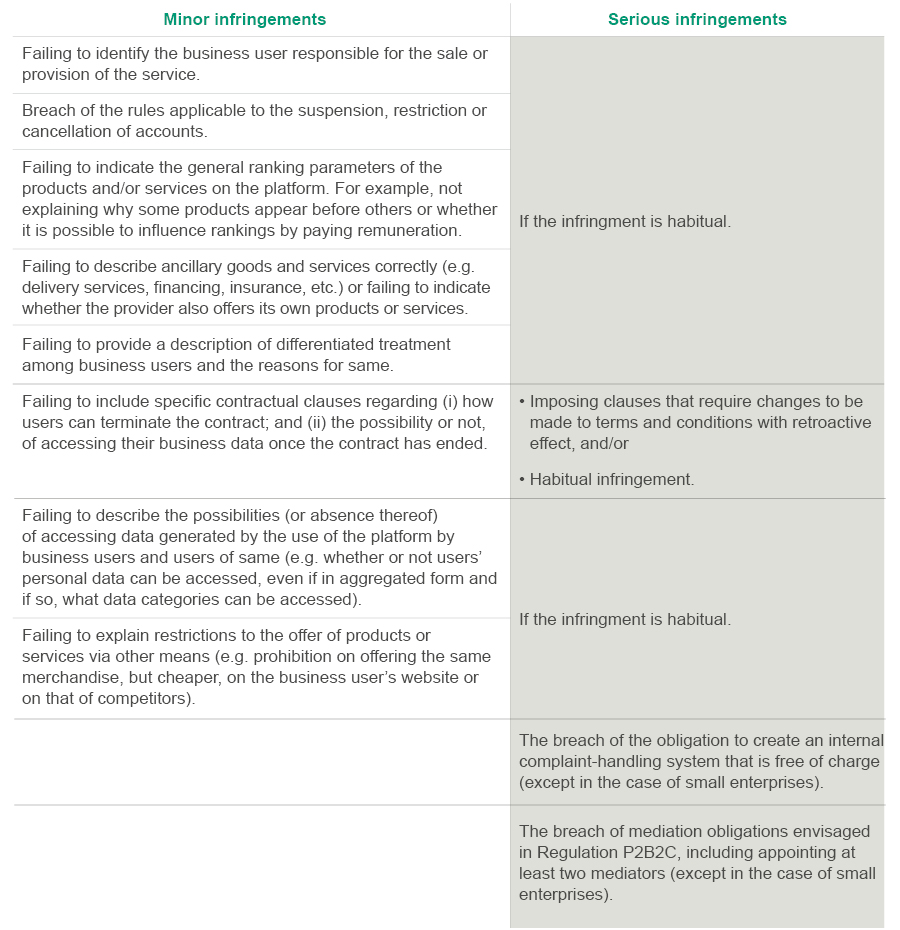The penalty system of the Regulation on fairness and transparency of digital platforms in Spain comes into force: Are you ready?
Cristina Mesa, Principal Associate of the Garrigues' Intellectual Property Department.

The recent approval of the law regulating certain aspects of electronic trust services, published in the Official State Gazette last November 12 and which came into force on November 13, sets out the penalty system that may be applied to digital platforms that do not meet European requirements on transparency and fairness in online trade in Spain, with fines of up to 150,000 euros.
Regulation (EU) 2019/1150 on promoting fairness and transparency for business users of online intermediation services (P2B2C Regulation) came into force discreetly on July 12. As we explained in a previous post on transparency obligations in online trade (see here), this regulation seeks to create a fairer and more transparent scenario in relation to large digital platforms e.g. marketplaces, app stores, sites that intermediate in the rental or sale of properties, home delivery, intermediation between individuals, search engines, etc.).
Perhaps the absence of a specific penalty system gave the mistaken impression that it was merely a good practices guide, making its obligations hard to believe. However, and again without much ado, Law 6/2020, of November 11, 2020, regulating certain aspects of electronic trust services, amends Information Society Services Law 34/2002, of July 11, 2002 (LSSI) introducing, among other aspects, the penalty system of Regulation P2B2C. Let’s take a look at the main developments.
What type of infringements does Regulation P2B2C envisage?
In relation to possible infringements of Regulation P2B2C, the LSSI establishes the following:

What penalties may be imposed on digital platforms that breach Regulation P2B2C?
The LSSI distinguishes between minor and serious infringements. Minor infringements can involve fines of up to EUR 30,000. With serious infringements fines range from EUR 30,001 to EUR 150,000.
The following aspects must be borne in mind in grading the amount of the penalties: (i) whether or not the infringement was intended; (ii) the duration of the infringement; (iii) whether it is a repeated infringement; (iv) the nature and amount of the damages caused; (v) the profit obtained by the infringement; and/or (vi) the billing volume affected by the infringement.
In addition, serious penalties can involve the publication of the penalty decision in the Official State Gazette, in the Gazette of the Public Authorities that imposed the penalty, in up to two newspapers with a circulation equal to that of the infringment, or even on the infringer’s website.
Which bodies will be in charge of controlling compliance with Regulation P2B2C?
The ability to supervise and control compliance with Regulation P2B2C lies with the ministry of Economic Affairs and Digital Transformation, as do the other obligations contained in the LSSI.
What measures do digital platforms need to take to comply with Regulation P2B2C?
With the introduction of a specific penalty system, digital intermediation platforms and search engines must ensure that they fulfill the obligations of Regulation P2B2C, which basically require:
- A review of the terms and conditions of use to make sure that they contain all of the information required by the Regulation and are written in clear, plain and comprehensible language;
- A review (or creation) of an agile internal complaint-handling systems in accordance with the requirements of Regulation P2B2C;
- To ensure that the system to amend the terms and conditions is equitable and does not contain restrictive or discretionary provisions;
- A reassessment of the circumstances in which business users’ accounts can be suspended, restricted or cancelled ;
- A reassessment of how the platform uses and provides access to the data, including technical and personal details, in order to provide this information to users under the appropriate terms and conditions;
- Closely manage the receipt of claims and the time it takes to settle them, with a view to the publication of the compulsory annual report;
- Contact mediators who must be included in the terms and conditions.
Having said this, it is important to bear in mind that Regulation P2B2C does not apply only to large intermediation platforms. Any platforms that mediate services between individuals and business users established in the EU must comply with its provisions. The list is broad and includes marketplaces, offers for the rental and sale of properties, sales between individuals, offers for provisional services, etc. It is therefore necessary to carry out an in-depth review of the business model and the way in which it is regulated in order to avoid breaching the new obligations imposed by Regulation P2B2C.